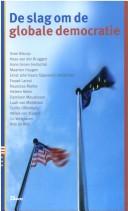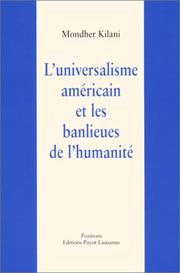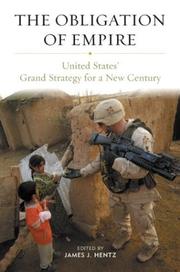| Listing 1 - 10 of 33 | << page >> |
Sort by
|
Book
ISBN: 1316792781 1316493938 131678942X 110714180X 1316506711 9781316506714 9781107141803 Year: 2016 Publisher: Cambridge : Cambridge University Press,
Abstract | Keywords | Export | Availability | Bookmark
 Loading...
Loading...Choose an application
- Reference Manager
- EndNote
- RefWorks (Direct export to RefWorks)
What are the consequences of retreat and retrenchment in foreign policy? In recent years, America has pulled back from its long-time role of international leadership. In doing so the Obama administration has sought to conciliate adversaries, shown indifference to allies; called upon the international community to step in; proclaimed and then disavowed 'red lines'; and preferred to lead from behind in the face of catastrophic civil war in Syria, ISIS barbarism in the Middle East and North Africa, Russia's predatory behavior in Eastern Europe, and China's muscle-flexing in East Asia. The consequences of this 'realist' experiment have been costly and painful, and it has caused the US to lose credibility with friends and foes. America retains the capacity to lead, but unless it resumes a more robust role, the world is likely to become a more dangerous place, with mounting threats not only to regional stability and international order, but to the national interests of America itself.

ISBN: 9066115939 9789066115934 Year: 2006 Publisher: Wormer Inmerc
Abstract | Keywords | Export | Availability | Bookmark
 Loading...
Loading...Choose an application
- Reference Manager
- EndNote
- RefWorks (Direct export to RefWorks)

ISBN: 2601033045 9782601033045 Year: 2002 Publisher: Lausanne : Payot-Lausanne,
Abstract | Keywords | Export | Availability | Bookmark
 Loading...
Loading...Choose an application
- Reference Manager
- EndNote
- RefWorks (Direct export to RefWorks)
Book
ISBN: 9781509517077 9781509517084 1509517073 1509517081 Year: 2018 Publisher: Cambridg (UK): Polity press,
Abstract | Keywords | Export | Availability | Bookmark
 Loading...
Loading...Choose an application
- Reference Manager
- EndNote
- RefWorks (Direct export to RefWorks)
"The age of Western hegemony is over. Whether or not America itself declines or thrives under President Trump's leadership, the post-war liberal international order underpinned by US military, economic and ideological primacy and supported by global institutions serving its power and purpose, is coming to an end. But what will take its place? A Chinese world order? A re-constituted form of American hegemony? A regionalized system of global cooperation, including major and emerging powers? In this updated and extended edition of his widely acclaimed book, Amitav Acharya offers an incisive answer to this fundamental question. While the US will remain a major force in world affairs, he argues that it has lost the ability to shape world order after its own interests and image. As a result, the US will be one of a number of anchors including emerging powers, regional forces, and a concert of the old and new powers shaping a new world order. Rejecting labels such as multipolar, apolar, or G-Zero, Acharya likens the emerging system to a multiplex theatre, offering a choice of plots (ideas), directors (power), and action (leadership) under one roof. Finally, he reflects on the policies that the US, emerging powers and regional actors must pursue to promote stability in this decentred but interdependent, multiplex world. Written by a leading scholar of the international relations of the non-Western world, and rising above partisan punditry, this book represents a major contribution to debates over the post-American era"--
INTERNATIONAL RELATIONS --- WORLD POLITICS --- USA--FOREIGN RELATIONS --- International organization --- World politics --- Regionalism --- Interregionalism --- United States --- Foreign relations --- World politics - 21st century --- United States - Foreign relations - 21st century
Book
ISBN: 9780801447563 9780801477157 0801447569 1336284110 0801457696 0801458935 0801477158 9780801457692 9780801458934 Year: 2011 Publisher: Ithaca, N.Y. Cornell University Press
Abstract | Keywords | Export | Availability | Bookmark
 Loading...
Loading...Choose an application
- Reference Manager
- EndNote
- RefWorks (Direct export to RefWorks)
International relations are generally understood as a realm of anarchy in which countries lack any superior authority and interact within a Hobbesian state of nature. In Hierarchy in International Relations, David A. Lake challenges this traditional view, demonstrating that states exercise authority over one another in international hierarchies that vary historically but are still pervasive today. Revisiting the concepts of authority and sovereignty, Lake offers a novel view of international relations in which states form social contracts that bind both dominant and subordinate members. The resulting hierarchies have significant effects on the foreign policies of states as well as patterns of international conflict and cooperation. Focusing largely on U.S.-led hierarchies in the contemporary world, Lake provides a compelling account of the origins, functions, and limits of political order in the modern international system. The book is a model of clarity in theory, research design, and the use of evidence.Motivated by concerns about the declining international legitimacy of the United States following the Iraq War, Hierarchy in International Relations offers a powerful analytic perspective that has important implications for understanding America's position in the world in the years ahead.
831 Internationale politieke economie --- 821 Internationaal recht --- International relations --- United States --- Foreign relations --- International relations. --- Relations internationales --- Etats-Unis --- Relations extérieures --- Coexistence --- Foreign affairs --- Foreign policy --- Global governance --- Interdependence of nations --- International affairs --- Peaceful coexistence --- World order --- National security --- Sovereignty --- World politics --- International relations. Foreign policy --- United States - Foreign relations - 21st century --- United States - Foreign relations - 21st century.

ISBN: 0813123321 9780813123325 Year: 2004 Publisher: Lexington University Press of Kentucky
Abstract | Keywords | Export | Availability | Bookmark
 Loading...
Loading...Choose an application
- Reference Manager
- EndNote
- RefWorks (Direct export to RefWorks)
"Since the final collapse of the Soviet Union in 1991, containment no longer defines U.S. grand strategy nor does it provide a geopolitical map for U.S. foreign policymakers. In The Obligation of Empire, James J. Hentz brings together original essays by leading scholars and policymakers to examine the widely varied grand strategy formulations and the potential heirs to containment at the outset of the twenty-first century." "The authors strive to make sense of the new world order by exploring the tensions between far-reaching global agendas and place-bound regionalist approaches. Applying their analysis to some of the most important policy questions of the twenty-first century, the contributors to The Obligation of Empire seek to reconcile the awesome weight of history with the uncertain challenges of the future."--BOOK JACKET
Book
ISBN: 9780745672489 9780745672472 0745672485 0745672477 Year: 2014 Publisher: Cambridge Malden Polity Press
Abstract | Keywords | Export | Availability | Bookmark
 Loading...
Loading...Choose an application
- Reference Manager
- EndNote
- RefWorks (Direct export to RefWorks)
International Cooperation --- World politics --- International relations --- United States --- Foreign relations --- International cooperation. --- 2001-2009 --- 2000 --- -International relations --- 2001 --- -United States --- -International cooperation. --- -International Cooperation --- United States - Foreign relations - 21st century
Book
ISBN: 9781442226333 9781442226326 1442226331 1442226323 144222634X Year: 2015 Publisher: Lanham, Maryland : Rowman & Littlefield,
Abstract | Keywords | Export | Availability | Bookmark
 Loading...
Loading...Choose an application
- Reference Manager
- EndNote
- RefWorks (Direct export to RefWorks)
"Offers a cogent overview of the historical context and enduring patterns of U.S. relations with Asia ... Robert G. Sutter provides a balanced analysis of post-Cold War dynamics in Asia, which involve interrelated questions of security, economics, national identity, and regional institution building. He demonstrates how these critical concerns manifest a complex mix of realist, liberal, and constructivist tendencies that define the regional order. Sutter weighs how the recent US emphasis on "re-engagement" with the broader Asia-Pacific fits within the context of regional dynamics. He assesses how the United States has responded to Asia's growing strength and importance while at the same time trying to maintain its leading position as an Asian power despite China's rising influence"--
Book
ISBN: 2847290362 9782847290363 Year: 2004 Publisher: Nantes : Pleins feux,
Abstract | Keywords | Export | Availability | Bookmark
 Loading...
Loading...Choose an application
- Reference Manager
- EndNote
- RefWorks (Direct export to RefWorks)
International organization --- Justice, Administration of --- Political aspects --- European Union --- European Union countries --- United States --- Foreign relations --- Political Science --- European Community --- International Relations --- Justice, Administration of - Political aspects --- European Union countries - Foreign relations - 21st century --- United States - Foreign relations - 21st century
Book
ISBN: 9780745331379 0745331378 Year: 2003 Publisher: Londen Pluto Press
Abstract | Keywords | Export | Availability | Bookmark
 Loading...
Loading...Choose an application
- Reference Manager
- EndNote
- RefWorks (Direct export to RefWorks)
The ten years of US foreign policy since 9/11 have been characterised by war, torture and rendition. In Power and Terror, Noam Chomsky places these developments in the context of America's long history of aggression and imperialism. Arguing that the US is responsible for much of the terror that it claims to be fighting, Chomsky elegantly explains US actions abroad and their deadly consequences. Including talks, question and answer sessions and unpublished essays, this collection offers the perfect introduction to Chomsky for those unfamiliar with his work, as well as a handy reference guide for seasoned activists. As Obama continues, and in some ways escalates, Bush's militarism, Power and Terror is a timely reminder of why it is so important to insist that the United States lives up to the moral standards it demands of others.
854 Terrorisme --- State-sponsored terrorism --- World politicsChomsky, Noam,United StatesForeign relations --- World politics --- Chomsky, Noam, --- United States --- Foreign relations --- World politics - 1995-2005 --- Chomsky, Noam, - 1928- - Interviews --- United States - Foreign relations - 21st century --- Chomsky, Noam, - 1928 --- -United States
| Listing 1 - 10 of 33 | << page >> |
Sort by
|

 Search
Search Feedback
Feedback About UniCat
About UniCat  Help
Help News
News